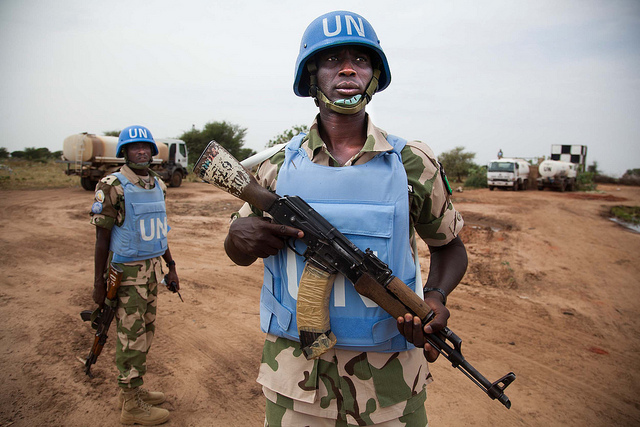Posing as Nigerian Soldiers, Boko Haram Slaughters Hundreds
/BORNO, Nigeria -- Boko Haram militants continue to spill blood throughout Nigeria. Reports are now surfacing that on Monday, 2 June 2014, the terror group carried out their latest attack in three small villages in Borno State, located in northeast Nigeria.
The rural nature of northeast Nigeria coupled with changing numbers of displaced and missing persons makes an exact body count hard to tally. But officials estimate that as many as 500 Nigerians were murdered during the attacks.
The militants targeted Danjara, Agalpawa and Antagara villages on Monday, dressed as Nigerian military members. Their appearance provided residents with momentary relief. Village leaders had asked for help from the Nigerian military amidst rumors of an impending attack, and when armed men dressed in Nigerian fatigues entered the three communities, many mistakenly felt that their concerns had finally been heard and validated by President Goodluck Johnathan.
At least 200 Nigerians are dead according to conservative estimates, while other sources claim as many as 500 men, women and children were killed during Monday's attack.
The terrorist organization is a collection of unapologetic murderers that toggle between kidnapping and outright mass murder. Since the abduction of 300 Nigerian schoolgirls, Boko Haram has targeted Christian and Muslim communities alike, pretending to be clergy members or Nigerian military service members.
After fraudulently gaining the trust of local Nigerians, Boko Haram offensives follow a similar pattern. The terrorists assemble Nigerians together for a public service announcement or a religious sermon, and outside of the mosque, church or community building, Boko Haram members open fire.
President Goodluck Johnathan has pledged to put an end to the mounting violence, but that promise has proved difficult for the Johnathan administration and security forces. Allegations of corruption and negligence have poured out after last month's kidnapping of the young female students. The families of the missing girls have blamed the government for their non-interventionist response. When Boko Haram strikes, there is little to no return fire coming from military squads.
Often, locals are left to their own devices to ward off their attackers. When Boko Haram assailed a Christian church in Antagara last month, four insurgents were killed. Across the country, community members are learning that they themselves are the last, and often only, line of defense against the antagonistic terrorists. But the episode outside of the church in Antagara did not discourage Boko Haram extremism.
In fact, it appears that the opposite is true. The militants have increased the number and scale of assaults in the weeks since they stormed Christians in Antagara, as retaliation against the vigilantes. It seems that Nigerians are caught in a dangerous double jeopardy, where inaction enables the terror group to kill without repercussion, and defensive efforts only increase future Boko Haram strikes.
While Nigeria is the most powerful economy on the African continent, northern Nigeria is less oil-rich and more rural. Residents face a significantly higher incidence of poverty. Great distances separate many of the village communities, and as a result, the Nigerian military has been powerless against the premeditated and nefarious activities of Boko Haram. Abuja, the capital city of Nigeria, is separated from the northeast targets both culturally and geographically, and this disconnect is exploited by the terrorists.
Operating under a deranged understanding of Islam, the Boko Haram militia has strengthened their available firepower in recent months, and continue to build media notoriety through suicide bombings.
As the wealth of Nigeria continues to grow, the understaffed and underfunded military programs become less and less excusable.
Follow Michael on Twitter Twitter: @nahmias_report Contributing Editor: @MAndrewRansom
Related articles
- Witnesses: Boko Haram militants slaughter hundreds (arkansasonline.com)
- Boko Haram militants slaughter at least 200 civilians in Nigeria, witnesses say (foxnews.com)
- Witnesses: Boko Haram militants slaughter hundreds (usnews.com)
- Boko Haram slaughters at least 200 in northeast Nigeria, witnesses say (csmonitor.com)
- Boko Haram slaughter 200 while disguised as soldiers (deadcitizensrightssociety.wordpress.com)


















